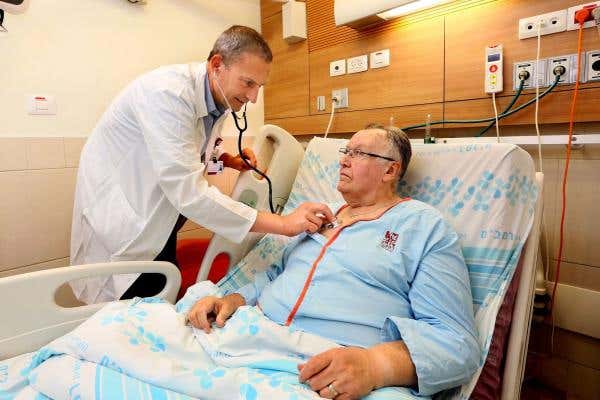Previously deadly heart condition reversed for the first-time ever
In a ground-breaking discovery that defies conventional medical understanding, three elderly men with heart failure experienced a reversal.

[Sept. 8, 2023: Staff Writer, The Brighter Side of News]
In a ground-breaking discovery that defies conventional medical understanding, three elderly men with heart failure caused by a build-up of sticky, toxic proteins have experienced a reversal of their condition. (CREDIT: Creative Commons)
In a ground-breaking discovery that defies conventional medical understanding, three elderly men with heart failure caused by a build-up of sticky, toxic proteins have experienced a reversal of their condition, sparking a flurry of new hope in the scientific community. This exceptional phenomenon was reported by a team at the University College London (UCL) and the Royal Free Hospital, both known for their cutting-edge research and patient care.
Amyloidosis, the condition these men were suffering from, is usually progressive and has until now been viewed as irreversible. This debilitating disease, specifically transthyretin cardiac amyloidosis, had been a veritable death sentence with half of the diagnosed patients succumbing to the condition within four years. Thus, these unexpected instances of reversal present a significant stride forward in our comprehension and potential treatment of the disease.
In a letter published in The New England Journal of Medicine, the research team laid out the details of these remarkable cases, explaining how three men aged 68, 76, and 82, diagnosed with transthyretin cardiac amyloidosis, recovered from their condition. The patients’ own accounts of symptom improvement were backed up by objective assessments, including cardiovascular magnetic resonance (CMR) scans, which demonstrated that the heart's amyloid protein accumulation had cleared.
Professor Marianna Fontana, the lead author of the study and part of the UCL Division of Medicine, reflected on the novel nature of this discovery: “We have seen for the first time that the heart can get better with this disease. That has not been known until now and it raises the bar for what might be possible with new treatments.”
Related Stories
Transthyretin (ATTR) amyloidosis, the culprit behind the men’s condition, is caused by amyloid deposits comprising a blood protein known as transthyretin (TTR). This disorder can either be hereditary or non-hereditary, colloquially referred to as the “wild-type”. The accumulation of these protein deposits in the heart, known as ATTR amyloid cardiomyopathy (ATTR-CM), significantly impairs the organ's function.
Existing treatments on the NHS primarily aim to alleviate heart failure symptoms, including fatigue, swelling in the legs or abdomen, and activity-induced shortness of breath. They do not, however, address the amyloid build-up itself. Nonetheless, several gene-silencing therapies are currently undergoing trials. These treatments are designed to reduce TTR protein concentration in the blood, thus slowing the ongoing formation of amyloid.
This study, funded by the Royal Free Charity, commenced when the 68-year-old patient reported an improvement in his symptoms. Prompted by this development, the researchers sifted through the records of 1,663 patients diagnosed with ATTR-CM, eventually identifying two additional cases mirroring the first.
The recovery of these three patients was authenticated through a combination of blood tests, multiple imaging techniques such as echocardiography, CMR scans, and scintigraphy, and, for one patient, an assessment of exercise capacity. Notably, CMR scans indicated that the heart's structure and function had returned to a near-normal state, and the amyloid had almost entirely cleared.
In-depth scrutiny of the records and assessments of the other patients in the cohort revealed that these three were the only ones who had experienced a reversal of their condition. One of the three patients underwent a heart muscle biopsy that revealed an atypical inflammatory response around the amyloid deposits. This indicated an immune reaction, something not detected in the 286 biopsies from patients whose disease had followed a conventional trajectory.
How amyloid buildup interferes with heart muscle. (CREDIT: Cleveland Clinic)
Upon further investigation, the researchers discovered antibodies in the three patients that bound specifically to ATTR amyloid deposits in both mouse and human tissue, as well as synthetic ATTR amyloid. There were no such antibodies present in 350 other patients in the cohort who had a typical clinical course.
The senior author of the study, Professor Julian Gillmore of the UCL Division of Medicine and the Head of the UCL Centre for Amyloidosis, based at the Royal Free Hospital, suggested: “Whether these antibodies caused the patients’ recovery is not conclusively proven. However, our data indicates that this is highly likely and there is potential for such antibodies to be recreated in a lab and used as a therapy. We are currently investigating this further, although this research remains at a preliminary stage.”
The implications of this discovery are manifold. If these antibodies can be harnessed, they could be amalgamated with new therapies currently being trialled that suppress TTR protein production. Such a combination could enable clinicians not only to prevent further amyloid deposition but also to clear away existing amyloid.
One such prospective therapy is a single intravenous infusion of NTLA-2001, a revolutionary gene-editing therapy based on the Nobel Prize-winning technology, CRISPR/Cas9. Preliminary results from the trial, led by Professor Gillmore, indicate that it may halt disease progression.
The UCL Centre for Amyloidosis is among the global leaders in amyloid research and is home to the NHS National Amyloidosis Centre, the sole UK centre specialising in amyloidosis. As such, this breakthrough emanates from a fertile ground of research prowess and innovative thinking.
Jon Spiers, Chief Executive of the Royal Free Charity, was enthused by the findings. “As an NHS charity, we are proud to be supporting this research. Our priority is to drive early-stage research that brings innovative treatments to patients sooner,” he said.
Spiers added, “This work not only represents a major breakthrough in our understanding of cardiac amyloidosis, but crucially opens up new possibilities for more effective treatment options. It’s a hugely significant development that we welcome on behalf of all patients of the National Amyloidosis Centre and their families, many of whom have contributed to our research funding with their own fundraising efforts.”
The Royal Free Charity is the NHS charity partner of the Royal Free London NHS Foundation Trust and the sole UK charity directly supporting the work of the National Amyloidosis Centre.
This staggering reversal of an otherwise progressive and fatal heart condition marks an unprecedented turn in the medical world. If these findings can be replicated and understood further, they might open doors to a myriad of therapeutic possibilities, potentially transforming the way we approach and treat amyloidosis and similar conditions in the future. As such, this research stands as a beacon of hope for countless patients globally, underscoring the potential for science to consistently redefine the boundaries of the possible.
For more science and technology stories check out our New Discoveries section at The Brighter Side of News.
Note: Materials provided above by The Brighter Side of News. Content may be edited for style and length.
Like these kind of feel good stories? Get the Brighter Side of News' newsletter.
Joseph Shavit
Head Science News Writer | Communicating Innovation & Discovery
Based in Los Angeles, Joseph Shavit is an accomplished science journalist, head science news writer and co-founder at The Brighter Side of News, where he translates cutting-edge discoveries into compelling stories for a broad audience. With a strong background spanning science, business, product management, media leadership, and entrepreneurship, Joseph brings a unique perspective to science communication. His expertise allows him to uncover the intersection of technological advancements and market potential, shedding light on how groundbreaking research evolves into transformative products and industries.



